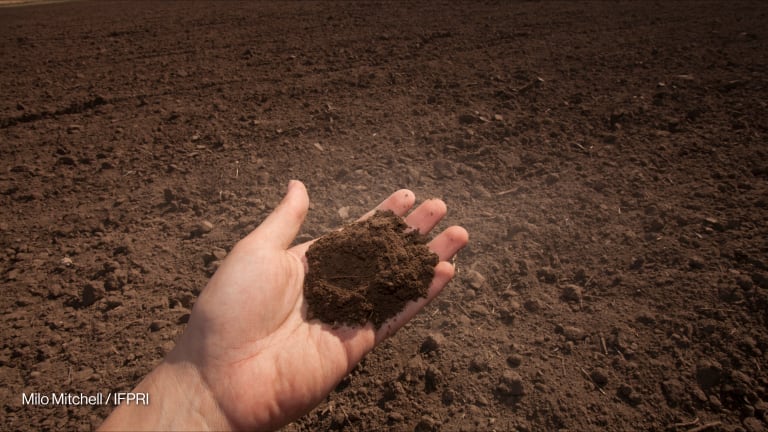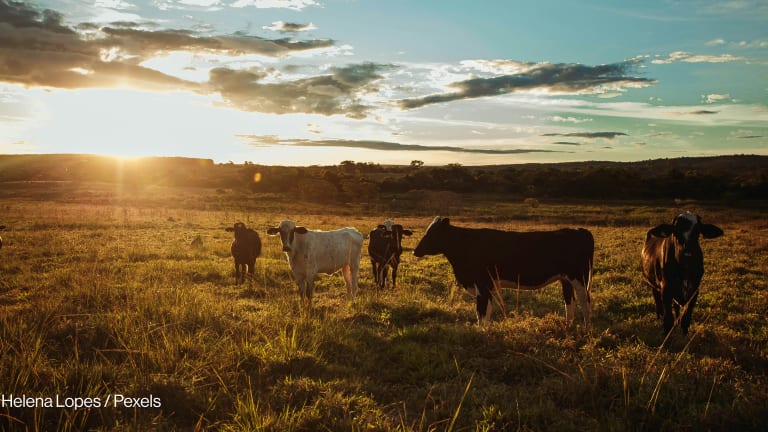What the world can learn from Denmark's carbon tax on agriculture
The Nordic country is set to become the first in the world to take this measure as part of its plan to slash its carbon footprint and seeks to inspire others to follow its steps.
Last month Denmark, a major pork and dairy exporter, reached a historic agreement with farming and conservation groups to introduce a carbon tax on livestock farming, making it the first country to do so. To fulfill Denmark’s target of cutting its greenhouse gas emissions by 70% from 1990 levels, the deal calls for taxing farmers 300 Danish krone (about $43) per ton of carbon dioxide equivalent emissions. The tax, which would start in 2030, would apply to all greenhouse gas emissions from livestock digestion and manure handling and will be increased to 750 Danish krone by 2035. From the start, Denmark wanted its tax to be a model for the rest of the world. Agriculture, forestry, and other land use contributed approximately 22% of human-made greenhouse gas emissions worldwide in 2019 — and in Denmark, at current rates agriculture and forestry are set to account for approximately 46% of emissions by the end of the decade. “To achieve the goal of the green transformation of the agricultural industry, it is essential that, in parallel with the national efforts, work continues to seek international influence and spread the vision for the future of the agricultural industry,” says the Agreement on a Green Denmark. Denmark’s move comes at a time when the global agriculture industry — and particularly livestock farming — faces pressure to reduce its emissions to help limit global warming. The Nordic nation of almost 6 million people has embarked on an ambitious national plan to slash its carbon footprint and transform its agriculture. That includes rolling out the world’s first action plan for plant-based foods to incentivize the production and consumption of vegan diets — in a country where people eat nearly three times the recommended amount of red meat. The carbon tax on agriculture is Denmark’s latest climate measure. These innovative moves could serve as examples for other countries that want to reduce emissions from livestock for the good of the climate — even as meat consumption and livestock farming are caught in political culture wars. “Danish politicians know that what we do in Denmark has extremely little effect on the global climate,” said Michael Svarer, professor at the economics department at Denmark’s Aarhus University and head of the government-commissioned group of experts who designed the tax architecture. “The way that this measure should impact the climate in the end is through replication in larger countries,” Svarer said. “If they do it in the European context, next you could go abroad.” Denmark’s agreement is still subject to passage by Parliament, though lawmakers are expected to approve it after the summer holidays. Getting farmers on board To implement its carbon tax, Denmark started by forming an Expert Group for a Green Tax Reform in 2021 to analyze everything from the economic benefits of climate action to the costs any changes would represent for farmers. The expert group published a report in February with three possible carbon tax models. The tax agreed upon in June is based on its recommendations, with some differences. For example, the agreement includes a basic tax deduction of 60% for farmers aimed at encouraging them to use the most climate-efficient methods and technologies, such as reduced fertilizer. The experts had recommended a tax deduction of 50%. “The reason behind it is, of course, to make the tax less hard for farmers who cannot change their production. It’s a political decision,” Svarer said. There was strong resistance from the Danish agricultural sector — or part of it — to the idea of a carbon tax. Some farmer groups argued that because of the sector’s exposure to the effects of climate change, they could only change their means of production with government help. Some experts generally call this resistance agricultural exceptionalism. “As they are producing food, they preserve themselves as having to be excluded from any kind of regulations,” said Nusa Urbancic, chief executive officer at Changing Markets Foundation. Among farmers worldwide, there’s often resistance to reforming existing agricultural subsidies — which are often quite generous — as well as resistance to new regulation, she added. Further, “they usually ask for money but only for voluntary measures, not mandatory ones,” Urbancic said. “They don’t really want accountability.” However, farmer groups in Denmark who opposed the agreement have said that it adds unnecessary bureaucracy and will result in lower food production. “We recognize that there is a climate problem, and Danish agriculture will help solve it. But we do not believe that this agreement will solve the problems because it will put a stick in the wheel of agriculture’s green investments,” said Peter Kiær, president of Bæredygtigt Landbrug, a Danish farmers organization that was not involved in the negotiations, in a statement. The arguments echo those of farmers who took to the streets across Europe earlier this year to protest what they view as already strict European Union green rules at a time when the sector is feeling the impacts of climate change. Denmark’s deal was agreed upon by the Danish government and the so-called Green Tripartite, comprised of the Danish Agriculture & Food Council, the Danish Society for Nature Conservation, the Food Union NNF, the Danish Union of Metalworkers, the Confederation of Danish Industry and the Association of Danish municipalities. “What is important is that the agricultural sector was part of this agreement,” Svarer said. “The clear strategy from the Danish government is to show, first to the European community, that it is possible to make an agreement with the agricultural sector to reduce its emissions,” he added. Denmark’s agreement could hold some lessons beyond Europe as well. In South America, for example, livestock farming plays a predominant role in countries such as Argentina, Brazil, Paraguay, and Uruguay. “The main challenge to implement a similar carbon tax in the region is the power exercised by the agricultural sector in the economic structure and political institutions of these countries,” said Lis García, a researcher Base-IS, a nonprofit research center focused on the rural reality. The predominant model of large tracts of land concentrated in the hands of a few owners creates strong political pressure against these kinds of climate policies. “There would be a possibility of implementing something similar only if this model changes,” García said. A start, at least Greenpeace Denmark considers the agreement “a bad deal” because it increases farmers’ tax deduction to 60% from the 50% that experts recommended and because it allows farmers to pay a lower tax rate compared to their industry counterparts. But it was important to “start with something,” Svarer said. “With the tax agreed, we will have a system and, later during the implementation, politicians can always make the necessary changes and, for example, reduce the deduction or change the tax rate,” he added. The experts had also recommended starting in 2028, while the agreed plan delays it to 2030. “If I’m a big farmer, I have cows, I can see that if I don’t change my behavior or if I don’t change my production, then I will have to pay big taxes in 2030 — I will start to change,” Svarer said. “The fact of knowing that there will be a tax still gives an incentive for farmers to change.” More than a carbon tax Implementing a carbon tax on agriculture requires addressing some challenges: Designing a new tax system, collecting data on farmers’ production, ensuring accountability and transparency of the process, and changing existing policies. “The case of the Danish carbon tax is interesting because it’s more than just the tax,” Urbancic said. As part of the agreement, the Danish government will also provide 40 billion Danish krone (about $5.8 billion) for a Green Acreage Fund that will establish new forests on 250,000 hectares of agricultural land by 2045, among other things. It will set aside 240,000 hectares of lowland by 2040 and will strategically acquire certain farms to reduce nitrogen emissions. The agreement also aims to protect at least 20% of Denmark’s natural land area. To implement something similar elsewhere, such as in South America, García said that a study would be needed to understand its potential effectiveness. “So far, it is observed that these types of measures do not stop the different forms of extractivism, but rather legitimize with a ‘green’ discourse the same polluting dynamics that are at the heart of the current climate crisis,” she said. Two key things should be promoted in any agricultural system transformation: An agrarian reform and a transition to agroecology led by peasants and Indigenous people, she added. In many countries, the power and pressure that some farming sector groups exert on policymakers would pose barriers to policy changes similar to Denmark’s. For example, a 2023 report by the Changing Markets Foundation shows how some meat and dairy sector groups spread misinformation on social media to push narratives in favor of meat and dairy production. Further, the rise of leaders who don’t focus on climate action or who even deny climate science — such as the former president of Brazil, Jair Bolsonaro, or the current president of Argentina, Javier Milei — adds even more difficulties to creating the political momentum necessary to start any first discussion on the topic. What’s ahead for Denmark New Zealand was the first country to hold advanced talks on a carbon tax on agriculture. But after last year’s elections, the new government decided to exclude the sector from the emissions trade scheme. So far, Denmark’s carbon tax seems headed for a different future. “The current government has a majority in the Parliament so they could just continue the process of voting knowing the result will be positive,” Svarer said. “But what they are trying to do is to get more parties on board so that they get a broader coalition.”
Last month Denmark, a major pork and dairy exporter, reached a historic agreement with farming and conservation groups to introduce a carbon tax on livestock farming, making it the first country to do so.
To fulfill Denmark’s target of cutting its greenhouse gas emissions by 70% from 1990 levels, the deal calls for taxing farmers 300 Danish krone (about $43) per ton of carbon dioxide equivalent emissions. The tax, which would start in 2030, would apply to all greenhouse gas emissions from livestock digestion and manure handling and will be increased to 750 Danish krone by 2035.
From the start, Denmark wanted its tax to be a model for the rest of the world. Agriculture, forestry, and other land use contributed approximately 22% of human-made greenhouse gas emissions worldwide in 2019 — and in Denmark, at current rates agriculture and forestry are set to account for approximately 46% of emissions by the end of the decade.
This story is forDevex Promembers
Unlock this story now with a 15-day free trial of Devex Pro.
With a Devex Pro subscription you'll get access to deeper analysis and exclusive insights from our reporters and analysts.
Start my free trialRequest a group subscription Printing articles to share with others is a breach of our terms and conditions and copyright policy. Please use the sharing options on the left side of the article. Devex Pro members may share up to 10 articles per month using the Pro share tool ( ).
Tais Gadea Lara is a climate journalist from Argentina. She has been covering the climate negotiations and international politics since 2014. She is currently a climate explorer at the Constructive Institute. She is the author of the newsletter Planeta and collaborates in different media, such as the National Geographic, Climática La Marea, and Climate Tracker. In 2020, she created the Environmental Journalism Workshop to train more people in the communication of the climate and ecological crisis. For several years, she has been recognized as one of the 100 Latinos most committed to climate action.








